have 的用法小结
have的各种意思及用法
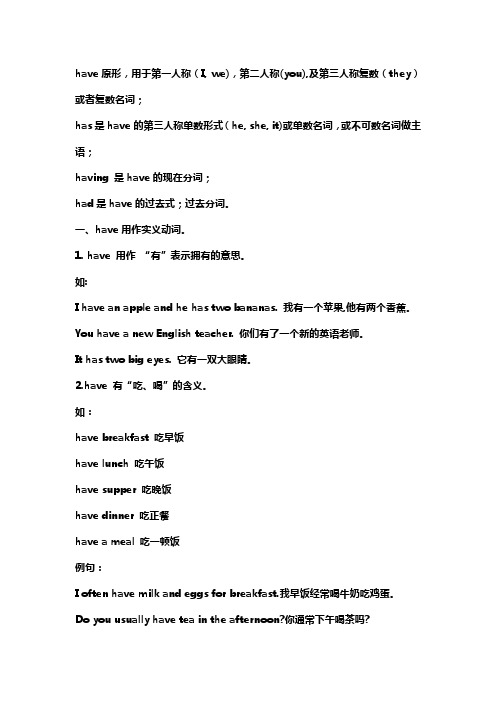
have原形,用于第一人称(I, we),第二人称(you),及第三人称复数(they)或者复数名词;has是have的第三人称单数形式(he, she, it)或单数名词,或不可数名词做主语;having 是have的现在分词;had是have的过去式;过去分词。
一、have用作实义动词。
1. have 用作“有”表示拥有的意思。
如:I have an apple and he has two bananas. 我有一个苹果,他有两个香蕉。
You have a new English teacher. 你们有了一个新的英语老师。
It has two big eyes. 它有一双大眼睛。
2.have 有“吃、喝”的含义。
如:have breakfast 吃早饭have lunch 吃午饭have supper 吃晚饭have dinner 吃正餐have a meal 吃一顿饭例句:I often have milk and eggs for breakfast.我早饭经常喝牛奶吃鸡蛋。
Do you usually have tea in the afternoon?你通常下午喝茶吗?What do you often have for your three meals?你的一日三餐通常吃什么?3.have 用来描述病情。
如:have a cold 感冒have a toothache牙痛have a fever发烧have a sore back背痛例句:“What’s the matter?”你怎么了?“I have a toothache.”我牙疼。
4. have to 不得不,与must意思相同。
如:I have to tidy my room.我不得不整理房间。
She has to help with the washing.她得帮忙洗衣服。
You don't have to go if you don't want to.如果你不想去,你就不必去。
万能词have的用法

万能词have的用法一、have的基本含义和用法1.1 have作为动词意味着“拥有”或“具备”•表示物品的所有权,例如:–I have a car.(我有一辆车。
)–She has three cats.(她有三只猫。
)•表示人们所具备的特质或能力,例如:–He has a great sense of humor.(他有很强的幽默感。
)–They have a lot of experience in this field.(他们在这个领域有很多经验。
)1.2 have用作情感或感觉的动词•表示经历或感受到某种情感或感觉,例如:–I have a headache.(我头疼。
)–She has a feeling of frustration.(她有种挫败感。
)二、have的其他用法2.1 have作为助动词•表示完成时态,例如:–They have gone to the cinema.(他们去电影院了。
)–He has finished his homework.(他完成了作业。
)2.2 have作为帮助构成某些动词短语•have + to + 动词原形,表示义务或必要性,例如:–I have to study for the exam.(我得为考试学习。
)–She has to finish the report by tomorrow.(她必须在明天之前完成报告。
)•have + 动词的过去分词,表示完成或被动的意义,例如:–We have finished our project.(我们完成了我们的项目。
)–The book has been read by many people.(这本书已经被很多人读过。
)2.3 have用作动词与介词的搭配•have + 宾语 + 介词短语,表示拥有或进行某种行为,例如:–He has a cup of coffee in the morning.(他早上喝一杯咖啡。
have 的用法

4.
have作“有”解释时,在英国的口语中,常 用have got 代替have.这种用法在疑问句和否 定句中比在肯定句中用得更多。 He owns a house in the countryside. =He has a house in the countryside. He has a TV set. = He has got a TV set. I have got a new bicycle. Have you got a new bicycle? I haven’t got a new bicycle. I have a new bicycle . Do you have a new bicycle? I don’t have a new bicycle.
短语 pick up pick up pick up pick up pick out
含义 拿起、捡起 意外地找到 (偶然地)学会 开车去接 挑出、选出、
例句
The snake charmer picked up the long pipe.
The bicycle was picked up in a small village . Didn’ t you pick up Chinese while you were in China? Where shall I pick you up,at your office or at your house?
3.
have作“有”解释时,否定式一般为 haven’t或hasn’t.这只有在have和宾语之间 有另一词如:any , an, a 等时,才可以使用, 如没有,一般用have no, has no. not a/ not any =no He has a beard. He has no beard. She hasn’t got a chance.(机会) I haven’t (got) any money. I haven’t (got) a very good friend.
have用法小结
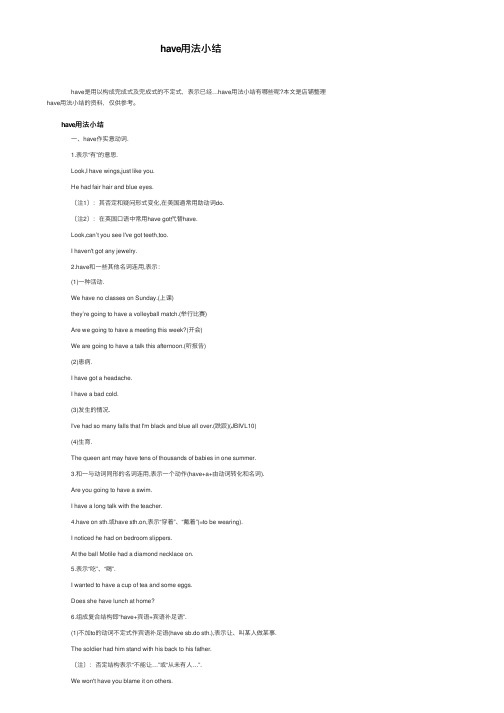
have⽤法⼩结 have是⽤以构成完成式及完成式的不定式,表⽰已经…have⽤法⼩结有哪些呢?本⽂是店铺整理have⽤法⼩结的资料,仅供参考。
have⽤法⼩结 ⼀、have作实意动词. 1.表⽰“有”的意思. Look,I have wings,just like you. He had fair hair and blue eyes. 〔注1〕:其否定和疑问形式变化,在美国通常⽤助动词do. 〔注2〕:在英国⼝语中常⽤have got代替have. Look,can’t you see I've got teeth,too. I haven't got any jewelry. 2.have和⼀些其他名词连⽤,表⽰: (1)⼀种活动. We have no classes on Sunday.(上课) they’re going to have a volleyball match.(举⾏⽐赛) Are we going to have a meeting this week?(开会) We are going to have a talk this afternoon.(听报告) (2)患病. I have got a headache. I have a bad cold. (3)发⽣的情况. I've had so many falls that I'm black and blue all over.(跌跤)(JBⅣL10) (4)⽣育. The queen ant may have tens of thousands of babies in one summer. 3.和⼀与动词同形的名词连⽤,表⽰⼀个动作(have+a+由动词转化和名词). Are you going to have a swim. I have a long talk with the teacher. 4.have on sth.或have sth.on,表⽰“穿着”、“戴着”(=to be wearing). I noticed he had on bedroom slippers. At the ball Motile had a diamond necklace on. 5.表⽰“吃”、“喝”. I wanted to have a cup of tea and some eggs. Does she have lunch at home? 6.组成复合结构即“have+宾语+宾语补⾜语”. (1)不加to的动词不定式作宾语补⾜语(have sb.do sth.),表⽰让、叫某⼈做某事. The soldier had him stand with his back to his father. 〔注〕:否定结构表⽰“不能让…”或“从未有⼈…”. We won't have you blame it on others. She had never had anybody speak to her that way before. (2)现在分词作宾语补⾜语(have sb.(sth.)doing),表⽰让(使)某⼈做某事. …the two men had their lights burning all night long…. (3)过去分词作宾语补⾜语(have sb.(sth.)done),表⽰: ①使(让,请)别⼈作某事,表⽰的动作是别⼈做的. Emperor Qin Shi Huang had all the walls joined up. …he should have new clothes made of this splendid cloth for the coming great procession. ②遭遇到某事. Houses near airports sometimes have their windows broken. Workers in some industries have their hearing harmed by the noise of the machine. ⼆、have与to⼀起构成情态动词,表⽰“不得不”、“必 须”,可⽤于各种时态. I have to look after her at home. 三、have做助动词与动词的过去分词⼀起构成现在完成时 和过去完成时. Great changes have taken place the last two years. They said that the Arab had stolen their camel. 四、have⽤于“情态动词+have+过去分词”的结构,有推测、假设之意. 1.must+have+过去分词,表⽰对过去时间发⽣的动作或存在的情况的推测,⼀般⽤于肯定句. Her father thought that she must have met a fairy. You must have left your bag in the theatre. 2.can(could)+have+过去分词,表⽰对过去发⽣事情的“不肯定”,常⽤于否定句和疑问句. He can't have been to your home,he doesn't know your address. 3.should+have+过去分词,表⽰“某事本该早做⽽实际未做”,⽤于肯定句. You should have been here five minutes ago. 五、have⽤于某些成语,表⽰固定的意思. 1.have a word(a few words)with sb.,表⽰和某⼈说⼀(⼏)句话. Where's Peter?I want to have a word with him. 2.had better+不带to的动词不定式,表⽰“…最好…”. I'd better go and look for him now. 3.have nothing(something)to do with,表⽰“和…⽆(有)”关系. Most of questions had nothing to do with Edison's lessons. 动词have的⽤法 动词have在中学英语中的⽤法 ⼀、have作实意动词。
have的用法小结
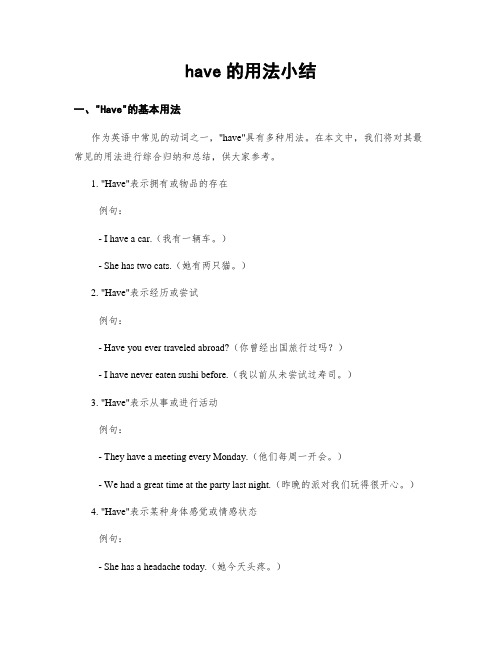
have的用法小结一、"Have"的基本用法作为英语中常见的动词之一,"have"具有多种用法。
在本文中,我们将对其最常见的用法进行综合归纳和总结,供大家参考。
1. "Have"表示拥有或物品的存在例句:- I have a car.(我有一辆车。
)- She has two cats.(她有两只猫。
)2. "Have"表示经历或尝试例句:- Have you ever traveled abroad?(你曾经出国旅行过吗?)- I have never eaten sushi before.(我以前从未尝试过寿司。
)3. "Have"表示从事或进行活动例句:- They have a meeting every Monday.(他们每周一开会。
)- We had a great time at the party last night.(昨晚的派对我们玩得很开心。
)4. "Have"表示某种身体感觉或情感状态例句:- She has a headache today.(她今天头疼。
)- He had a feeling of excitement when he heard the good news.(当他听到好消息时,他有一种兴奋的感觉。
)5. "Have"作为助动词形式例句:- She has been studying English for three years.(她已经学了三年英语了。
)- Have you finished your homework yet?(你的作业做完了吗?)二、"Have"的常见短语和惯用搭配除了以上基本用法外,"have"还有一些常见的短语和惯用搭配,让我们一起来了解一下。
1. "Have to"在表示义务、责任或需要时使用,意为“必须”。
have的用法及搭配
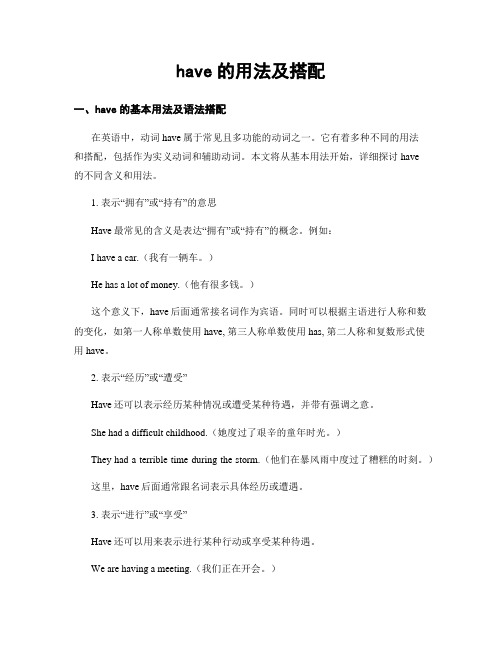
have的用法及搭配一、have的基本用法及语法搭配在英语中,动词have属于常见且多功能的动词之一。
它有着多种不同的用法和搭配,包括作为实义动词和辅助动词。
本文将从基本用法开始,详细探讨have的不同含义和用法。
1. 表示“拥有”或“持有”的意思Have最常见的含义是表达“拥有”或“持有”的概念。
例如:I have a car.(我有一辆车。
)He has a lot of money.(他有很多钱。
)这个意义下,have后面通常接名词作为宾语。
同时可以根据主语进行人称和数的变化,如第一人称单数使用have, 第三人称单数使用has, 第二人称和复数形式使用have。
2. 表示“经历”或“遭受”Have还可以表示经历某种情况或遭受某种待遇,并带有强调之意。
She had a difficult childhood.(她度过了艰辛的童年时光。
)They had a terrible time during the storm.(他们在暴风雨中度过了糟糕的时刻。
)这里,have后面通常跟名词表示具体经历或遭遇。
3. 表示“进行”或“享受”Have还可以用来表示进行某种行动或享受某种待遇。
We are having a meeting.(我们正在开会。
)I had a great time at the party.(我在派对上度过了愉快的时光。
)此时,have后面通常跟动词的现在分词形式作宾语。
4. 表示“发生”或“出现”Have也可以用来描述事件、情况或感觉的发生或出现。
I had a strange dream last night.(昨晚我做了一个奇怪的梦。
)She had a sudden memory of the accident.(她突然回想起那次事故。
)这种情况下,have后面通常用名词表示具体事件、情况或感觉。
5. 表示时间和日期Have在口语中还可用来指定具体时间和日期。
We're having dinner at 7 o'clock tonight.(今晚七点我们要吃晚饭。
have的五种基本形式和用法
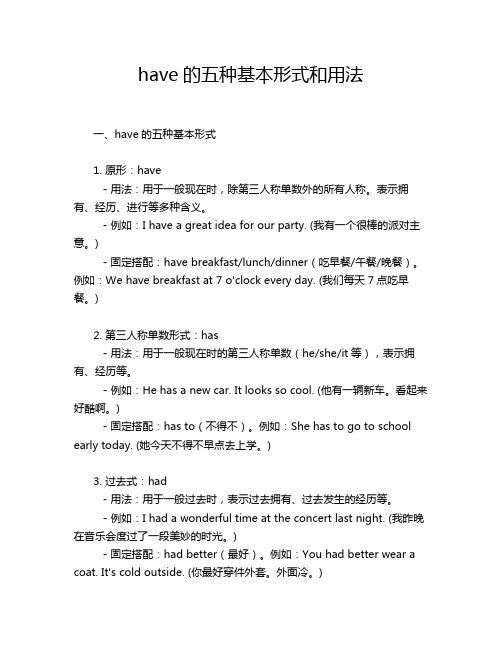
have的五种基本形式和用法一、have的五种基本形式1. 原形:have- 用法:用于一般现在时,除第三人称单数外的所有人称。
表示拥有、经历、进行等多种含义。
- 例如:I have a great idea for our party. (我有一个很棒的派对主意。
)- 固定搭配:have breakfast/lunch/dinner(吃早餐/午餐/晚餐)。
例如:We have breakfast at 7 o'clock every day. (我们每天7点吃早餐。
)2. 第三人称单数形式:has- 用法:用于一般现在时的第三人称单数(he/she/it等),表示拥有、经历等。
- 例如:He has a new car. It looks so cool. (他有一辆新车。
看起来好酷啊。
)- 固定搭配:has to(不得不)。
例如:She has to go to school early today. (她今天不得不早点去上学。
)3. 过去式:had- 用法:用于一般过去时,表示过去拥有、过去发生的经历等。
- 例如:I had a wonderful time at the concert last night. (我昨晚在音乐会度过了一段美妙的时光。
)- 固定搭配:had better(最好)。
例如:You had better wear a coat. It's cold outside. (你最好穿件外套。
外面冷。
)4. 现在分词:having- 用法:用于进行时态(如现在进行时、过去进行时等),表示正在进行的动作或状态。
- 例如:They are having a meeting right now. (他们现在正在开会。
)- 固定搭配:无特定非常独特的只与having相关的固定搭配,但在短语如having fun(玩得开心)中使用。
例如:We are having fun at the amusement park. (我们正在游乐园玩得开心。
have的用法

have的用法have的用法英语是一种西日耳曼语支,最早被中世纪的英国使用,并因其广阔的殖民地而成为世界使用面积最广的语言。
下面是小编收集整理的have的用法,仅供参考,希望能够帮助到大家。
一、have + 宾语 + 不定式该结构中have的基本意思是“有”,其主要用法有:1. 表示有某事要做,其中的'不定式为定语。
如:She did n’t have the courage to refuse. 她没有勇气拒绝。
Birds have the instinct to learn to fly. 鸟有飞的本能。
We have every reason to think he may still be alive. 我们有充分理由认为他可能还活着。
2. 表示因为有A结果发生了B,其中的不定式为结果状语。
如:I had the luck to find him at home. 我真幸运,找他时他正在家。
They had the misfortune to be hit by a violent storm. 他们不幸遇上了猛烈的风暴。
二、have + 宾语 + 动词原形该结构中的动词原形,实为省略了to的不定式,用作宾语补足语,其中的have为使役动词。
该结构的主要用法有:1. 表示叫(请、使、让)某人做某事。
如:He had his son clean the car. 他叫他的儿子擦车。
I’ll have the gardener plant some trees. 我要让园丁种些树。
Don’t interrupt h er:let her have her say. 别打断她的话,让她把意见说出来。
2. 表示容忍或允许某人做某事(用于否定句,尤与won’t, can’t 连用)。
如:I won’t have you tell me what to do. 我不能让你对我做的事指手划脚。
动词have的用法规则总结

动词have的用法规则总结一、have的常见用法及规则1. 表示拥有或具备某种物品或特征- 表示物品的拥有:I have a car.- 表示个人特征:She has blue eyes.2. 表示经历、感受或经受某种情绪- 经历:We had a great time at the party.- 感受:He had a feeling of excitement.- 经受情绪:She had a panic attack.3. 表示进行或完成某项活动、行动或任务- 进行活动:They have lunch together every day.- 完成任务:I have finished my homework.4. 表示发生在过去的事件- 过去事件:They had an argument yesterday.5. 用于构成某些固定表达和习语- Have a good day!- I have my doubts about his story.二、have的时态和形式变化1. 现在时:- 肯定句:I/we/you/they/he/she/it + have + 名词或不定式(原形)- 否定句:I/we/you/they/he/she/it + do not/don't + have + 名词或不定式(原形)- 疑问句:Do + I/we/you/they/he/she/it + have + 名词或不定式(原形)?2. 过去时:- 肯定句:I/we/you/they/he/she/it + had + 名词或不定式(原形)- 否定句:I/we/you/they/he/she/it + did not/didn't + have + 名词或不定式(原形)- 疑问句:Did + I/we/you/they/he/she/it + have + 名词或不定式(原形)?3. 将来时:- 肯定句:I/we/you/they/he/she/it + will/shall/shan't + have + 名词或不定式(原形)- 否定句:I/we/you/they/he/she/it + will not/won't/shan't + have+ 名词或不定式(原形)- 疑问句:Will/Shall + I/we/you/they/he/she/it + have+ 名词或不定式(原形)?4. 完成时:表示过去的已完成动作,并对现在造成影响。
万能词have的用法

万能词have的用法万能词have的用法Have是英语中非常常见的一个词汇,它有多种不同的用法和意思。
在这里,我们将详细介绍have的各种用法和例句。
一、作为动词1. 表示拥有Have可以表示“拥有”的意思,例如:I have a car.(我有一辆车。
)She has two cats.(她有两只猫。
)2. 表示经历或经受Have也可以表示“经历”或“经受”的意思,例如:I have had a great time on my trip.(我在旅行中度过了美好的时光。
)He has experienced many difficulties in his life.(他在生活中经历了许多困难。
)3. 表示完成某项任务或动作Have还可以表示完成某项任务或动作的意思,例如:I have finished my homework.(我已经完成了我的家庭作业。
)She has cooked dinner for us.(她为我们做了晚餐。
)4. 表示发生或存在Have还可以表示“发生”或“存在”的意思,例如:There has been an accident on the highway.(高速公路上发生了事故。
)She has a lot of friends in this city.(她在这个城市有很多朋友。
)5. 表示情感状态Have还可以表示情感状态,例如:I have a headache today.(我今天头疼。
)She has a happy smile on her face.(她脸上挂着幸福的微笑。
)6. 表示需要或必须Have还可以表示“需要”或“必须”的意思,例如:I have to finish this project by tomorrow.(我必须在明天之前完成这个项目。
)She has to go to the doctor for a check-up.(她需要去医生那里做个体检。
have用法大全归纳
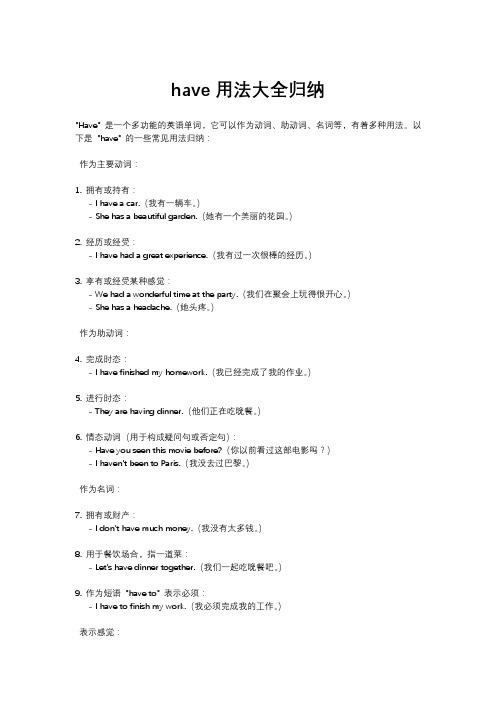
have用法大全归纳"Have" 是一个多功能的英语单词,它可以作为动词、助动词、名词等,有着多种用法。
以下是"have" 的一些常见用法归纳:作为主要动词:1. 拥有或持有:- I have a car.(我有一辆车。
)- She has a beautiful garden.(她有一个美丽的花园。
)2. 经历或经受:- I have had a great experience.(我有过一次很棒的经历。
)3. 享有或经受某种感觉:- We had a wonderful time at the party.(我们在聚会上玩得很开心。
)- She has a headache.(她头疼。
)作为助动词:4. 完成时态:- I have finished my homework.(我已经完成了我的作业。
)5. 进行时态:- They are having dinner.(他们正在吃晚餐。
)6. 情态动词(用于构成疑问句或否定句):- Have you seen this movie before?(你以前看过这部电影吗?)- I haven't been to Paris.(我没去过巴黎。
)作为名词:7. 拥有或财产:- I don't have much money.(我没有太多钱。
)8. 用于餐饮场合,指一道菜:- Let's have dinner together.(我们一起吃晚餐吧。
)9. 作为短语"have to" 表示必须:- I have to finish my work.(我必须完成我的工作。
)表示感觉:10. 表示感觉或状态:- I have a headache.(我头疼。
)- She has a cold.(她感冒了。
)表示关系:11. 表达关系或存在:- I have a friend in New York.(我在纽约有一个朋友。
have的六种用法

have的六种用法Have: The Most Versatile English VerbHave的六种用法Have是一个普遍存在的英语动词,它的用法十分普遍、丰富,出现频率也比较多。
以下是have最常见的六种用法:一、表示拥有Have表示拥有最常见的用法,翻译为“拥有”或“有”,当拥有名词时,就需要用have这个动词来表达,同时也可以表示“具有”的意思:e.g. He has a house and a car.他有一栋房子和一辆车。
二、表示经历表示经历这种用法,比较容易把have和experience混淆在一起,但有一点要注意,have表示的是客观的事实,可以看出来,而experience是客观事实外的主观感受:e.g. I have never been to the museum before.我以前从未去过博物馆。
三、表示心理活动Have可以用来表示某些心理活动,也就是表示一些情感,这里也就和experience用法有所异同,have表示这种感受是客观的,而experience表示的时主观的:e.g. I have a fear of high places.我有一种对高处的恐惧。
四、表述身体状况have还可以描述某人的身体状况,常见的有:have a cold、have a fever、have a headache等等:e.g. She has a cold.她有点感冒。
五、表示依据have可以表示一个依据,也就是表明某一活动是有目的的:e.g. I have a plan to visit the Great Wall.我有一个去参观长城的计划。
六、表示未来的计划have也可以用来表示有关未来的计划,也就是表达某一动作(一般是准备做或者是准备去做):e.g. It’s Saturday. I have to go to school tomorrow.今天是星期六,明天我得去上学。
have的用法和例句
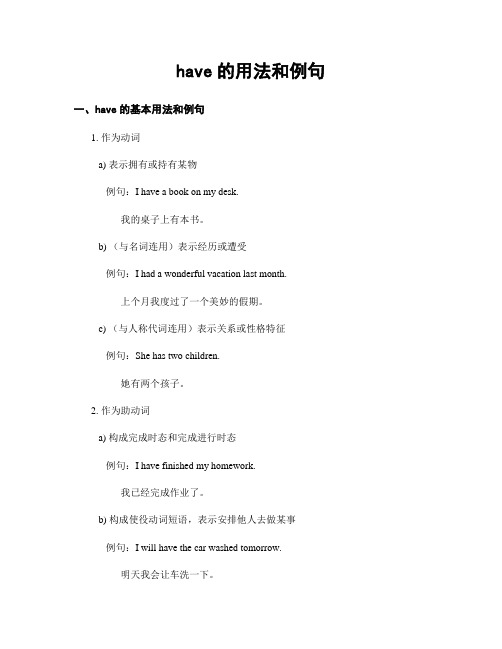
have的用法和例句一、have的基本用法和例句1. 作为动词a) 表示拥有或持有某物例句:I have a book on my desk.我的桌子上有本书。
b) (与名词连用)表示经历或遭受例句:I had a wonderful vacation last month.上个月我度过了一个美妙的假期。
c) (与人称代词连用)表示关系或性格特征例句:She has two children.她有两个孩子。
2. 作为助动词a) 构成完成时态和完成进行时态例句:I have finished my homework.我已经完成作业了。
b) 构成使役动词短语,表示安排他人去做某事例句:I will have the car washed tomorrow.明天我会让车洗一下。
3. 引申用法:a) 表示感官体验,通常与现在完成时连用例句:Have you ever seen the Northern Lights?你曾经看过北极光吗?b) 表示需要或要求,通常与不定式连用例句:I have to go to work early tomorrow.明天我得早点去上班。
二、have的进一步用法和例句1. 表示经历、遭受或感受a) have a good time: 过得愉快例句:We had a good time at the party yesterday.我们昨天在派对上过得很愉快。
b) have difficulty/trouble (in) + 动名词/名词从句:有困难/麻烦(做某事)例句:She had difficulty finding a job after graduation.她毕业后找工作有些困难。
2. 表示完成或达到某个状态a) have something done: 请人做某事例句:I will have my car repaired tomorrow.明天我会请人修理我的车。
have_用法小结
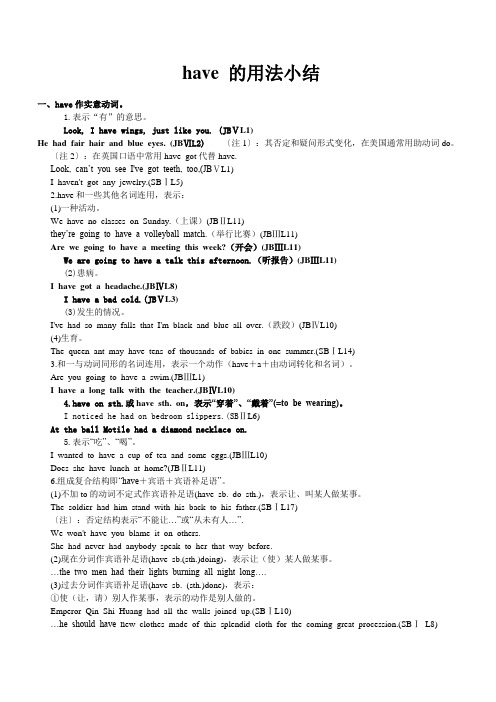
have 的用法小结一、have作实意动词。
1.表示“有”的意思。
Look, I have wings, just like you. (JBⅤL1)He had fair hair and blue eyes. (JBⅥL2) 〔注1〕:其否定和疑问形式变化,在美国通常用助动词do。
〔注2〕:在英国口语中常用have got代替have.Look, can’t you see I've got teeth, too,(JBⅤL1)I haven't got any jewelry.(SBⅠL5)2.have和一些其他名词连用,表示:(1)一种活动。
We have no classes on Sunday.(上课)(JBⅡL11)they’re going to have a volleyball match.(举行比赛)(JBⅢL11)Are we going to have a meeting this week?(开会)(JBⅢL11)We are going to have a talk this afternoon.(听报告)(JBⅢL11)(2)患病。
I have got a headache.(JBⅣL8)I have a bad cold.(JBⅤL3)(3)发生的情况。
I've had so many falls that I'm black and blue all over.(跌跤)(JBⅣL10)(4)生育。
The queen ant may have tens of thousands of babies in one summer.(SBⅠL14)3.和一与动词同形的名词连用,表示一个动作(have+a+由动词转化和名词)。
Are you going to have a swim.(JBⅢL1)I have a long talk with the teacher.(JBⅣL10)4.have on sth.或have sth. on,表示“穿着”、“戴着”(=to be wearing)。
Have的用法总结

05
Have的否定和疑问形式
否定形式
要点一
表示“没有”或“不具备”某物 或某种特征,例如
“I haven't a car.”(我没有车。)
要点二
在完成时态中,表示过去某个时 间到现在为止未完成的动作或…
“I haven't finished my homework yet.”(我还没完成 作业。)
影响。
例句
I have been studying English for two years.(我已经学习英语两年了 。)
例句
She has been waiting for you for an hour.(她已经等你一个小时了。 )
04
Have的短语和搭配
Have a good time
表示“过得愉快”,常用于祝愿他人 度过美好时光。
例句
Yesterday, I had to stay at home because I was sick.(昨天我因为生病 不得不呆在家里。)
Have got的用法
表示拥有
用于表达某人拥有某物,相当于“有”。
例句
I have got a new car.(我有一辆新车。)
口语中的常用表达
在口语中,常用have got代替have,表示一种更为口语化、非正式的表达方式。
She has been a member of the club for two years.(她加入这个俱乐部已经两年了。)
表示存在
表示某地有某物
01
There is a bank on the corner.(街角有一家银行。
)
表示某人有某种特征或属性
02
have的用法总结
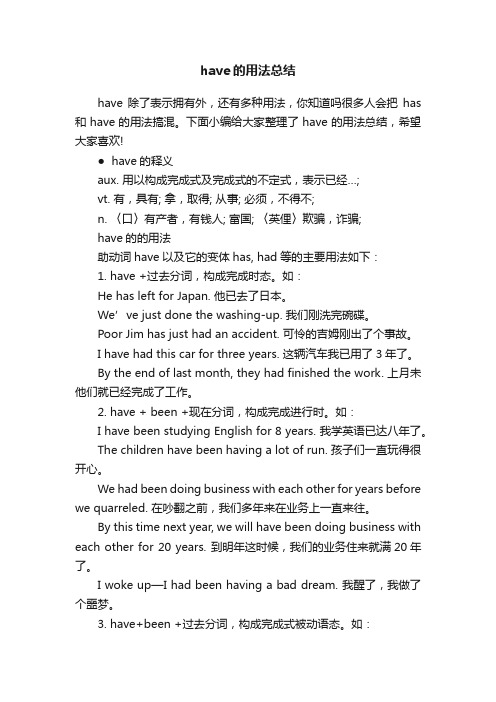
have的用法总结have除了表示拥有外,还有多种用法,你知道吗很多人会把has 和have的用法搞混。
下面小编给大家整理了have的用法总结,希望大家喜欢!● have的释义aux. 用以构成完成式及完成式的不定式,表示已经…;vt. 有,具有; 拿,取得; 从事; 必须,不得不;n. 〈口〉有产者,有钱人; 富国; 〈英俚〉欺骗,诈骗;have的的用法助动词have以及它的变体has, had等的主要用法如下:1. have +过去分词,构成完成时态。
如:He has left for Japan. 他已去了日本。
We’ve just done the washing-up. 我们刚洗完碗碟。
Poor Jim has just had an accident. 可怜的吉姆刚出了个事故。
I have had this car for three years. 这辆汽车我已用了3年了。
By the end of last month, they had finished the work. 上月未他们就已经完成了工作。
2. have + been +现在分词,构成完成进行时。
如:I have been studying English for 8 years. 我学英语已达八年了。
The children have been having a lot of run. 孩子们一直玩得很开心。
We had been doing business with each other for years before we quarreled. 在吵翻之前,我们多年来在业务上一直来往。
By this time next year, we will have been doing business with each other for 20 years. 到明年这时候,我们的业务住来就满20年了。
I woke up—I had been having a bad dream. 我醒了,我做了个噩梦。
have 的用法总结
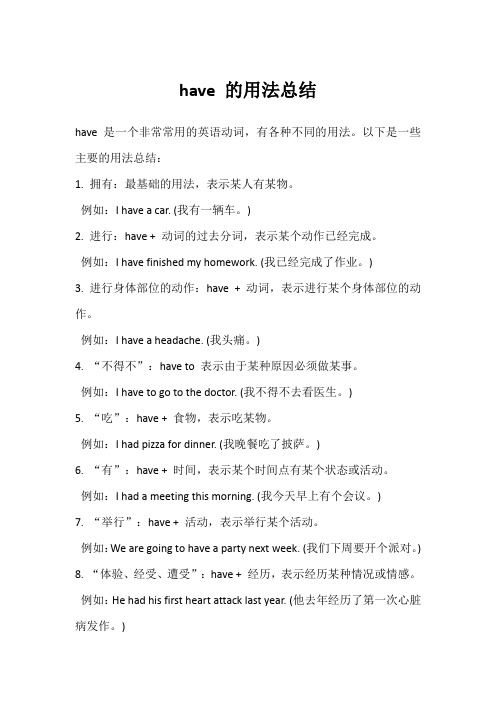
have 的用法总结have 是一个非常常用的英语动词,有各种不同的用法。
以下是一些主要的用法总结:1. 拥有:最基础的用法,表示某人有某物。
例如:I have a car. (我有一辆车。
)2. 进行:have + 动词的过去分词,表示某个动作已经完成。
例如:I have finished my homework. (我已经完成了作业。
)3. 进行身体部位的动作:have + 动词,表示进行某个身体部位的动作。
例如:I have a headache. (我头痛。
)4. “不得不”:have to 表示由于某种原因必须做某事。
例如:I have to go to the doctor. (我不得不去看医生。
)5. “吃”:have + 食物,表示吃某物。
例如:I had pizza for dinner. (我晚餐吃了披萨。
)6. “有”:have + 时间,表示某个时间点有某个状态或活动。
例如:I had a meeting this morning. (我今天早上有个会议。
)7. “举行”:have + 活动,表示举行某个活动。
例如:We are going to have a party next week. (我们下周要开个派对。
)8. “体验、经受、遭受”:have + 经历,表示经历某种情况或情感。
例如:He had his first heart attack last year. (他去年经历了第一次心脏病发作。
)9. 使役:have + 宾语+ 宾补,表示让某人或某物做某事。
例如:I had my car repaired. (我让我的车得到了修理。
)10. “取得、获得”:have + 宾语,表示取得或获得某物。
例如:He had a degree in engineering. (他获得了工程学的学位。
)这只是have 的部分用法,这个动词在英语中非常丰富和灵活,可以根据语境和搭配有不同的含义和用法。
have的用法

“have+宾语+分词”结构用法归纳一、have+宾语+现在分词(1) 使(让)某人(某事物)一直做在做某事:He had the light burning all night. 他让灯亮了一整夜。
Within minutes he had the whole audience laughing and clapping. 没出几分钟他就让全体听众笑起来,鼓起掌来。
(2) 容忍或允许某人做某事(用于否定句,尤与won’t, can’t连用):He won’t have boys arriv ing late. 他不允许孩子们迟到。
I won’t have you smoking at your age. 我不能让你在这个年纪就抽烟。
(3) 说服或命令某人做某事:He had me doing all kinds of jobs for her. 他叫我为她做各种事情。
二、have+宾语+过去分词(1) 请(让)别人做某事:We had the machine repaired. 我们请人修理了机器。
W hy don’t you have your hair cut? 你为什么不理发?【注】有时指无意志的行为:He had his salary raised. 他加薪了。
(2) 经历或遭遇某情况:He had his finger cut. 他的手指弄伤了。
I had my watch stolen yesterday. 我的表昨天被人偷去了。
(3) 完成或解决某事:He had 1000 yuan saved last year. 他去年存了1000元。
I’ve had all my mi stakes corrected. 我已把所有的错误都改正过来了。
(4) 容忍或允许做某事(用于否定句,尤与won’t, can’t 等连用):We won’t have anything said against the Party. 我们不允许有人这样攻击党。
- 1、下载文档前请自行甄别文档内容的完整性,平台不提供额外的编辑、内容补充、找答案等附加服务。
- 2、"仅部分预览"的文档,不可在线预览部分如存在完整性等问题,可反馈申请退款(可完整预览的文档不适用该条件!)。
- 3、如文档侵犯您的权益,请联系客服反馈,我们会尽快为您处理(人工客服工作时间:9:00-18:30)。
专题之have 的用法小结
have作实意动词。
一、 1.表示“有”的意思。
Look, I have wings, just like you.
He had fair hair and blue eyes. 〔注1〕:其否定和疑问形式变化,在美国通常用助动词do。
〔注2〕:在英国口语中常用have got代替have.
和一些其他名词连用,表示:
(1)一种活动。
We have no classes on Sunday.(上课)
they're going to have a volleyball match.(举行比赛)
Are we going to have a meeting this week(开会)
We are going to have a talk this afternoon.(听报告)
(2)患病。
I have got a headache.
发生的情况。
(3)
I've had so many falls that I'm black and blue all over.(跌跤)
(4)生育。
The queen ant may have tens of thousands of babies in one summer.
3.和一与动词同形的名词连用,表示一个动作(have+a+由动词转化和名词)。
Are you going to have a swim.
I have a long talk with the teacher.
on sth.或have sth. on,表示“穿着”、“戴着”(=to be wearing)。
I noticed he had on bedroom slippers.(SBⅡL6)
At the ball Motile had a diamond necklace on.
5.表示“吃”、“喝”。
I wanted to have a cup of tea and some eggs.
Does she have lunch at home?。
”+宾语+宾语补足语“have组成复合结构即6.
(1)不加to的动词不定式作宾语补足语(have sb. do sth.),表示让、叫某人做某事。
The soldier had him stand with his back to his father.
〔注〕:否定结构表示“不能让…”或“从未有人…”.
We won't have you blame it on others.
She had never had anybody speak to her that way before.
(2)现在分词作宾语补足语(have sb.(sth.)doing),表示让(使)某人做某事。
…the two men had their lights burning all night long….
(3)过去分词作宾语补足语(have sb. (sth.)done),表示:
①使(让,请)别人作某事,表示的动作是别人做的。
Emperor Qin Shi Huang had all the walls joined up.
…he should have new clothes made of this splendid cloth for
the coming great procession.
②遭遇到某事。
broken.windows their have sometimes airports near Houses Workers in some industries have their hearing harmed by the noise of the machine.
二、have与to一起构成情态动词,表示“不得不”、“必
须”,可用于各种时态。
I have to look after her at home.
三、have做助动词与动词的过去分词一起构成现在完成时
和过去完成时。
Great changes have taken place the last two years.
They said that the Arab had stolen their camel.
四、have用于“情态动词+have+过去分词”的结构,有
推测、假设之意。
+have+过去分词,表示对过去时间发生的动作或存在的情况的推测,一般用于肯定句。
Her father thought that she must have met a fairy.
theatre. the in bag your left have must You
(could)+have+过去分词,表示对过去发生事情的“不肯定”,常用于否定句和疑问句。
He can't have been to your home, he doesn't know your address.
+have+过去分词,表示“某事本该早做而实际未做”,用于肯
定句。
You should have been here five minutes ago.
五、have用于某些成语,表示固定的意思。
a word(a few words)with sb.,表示和某人说一(几)句话。
Where's Peter I want to have a word with him.
better+不带to的动词不定式,表示“…最好…”。
I'd better go and look for him now.
nothing(something)to do with,表示“和…无(有)”关系。
Most of questions had nothing to do with Edison's lessons.。
